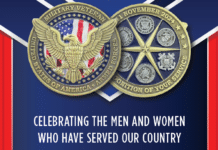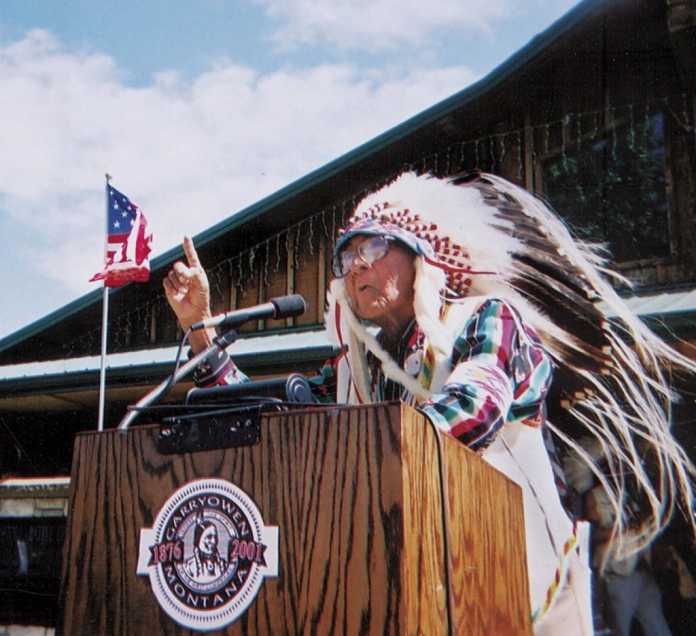According to Crow tradition, a man must fulfill certain requirements to become chief of the tribe: command a war party successfully, enter an enemy camp at night and steal a horse, wrestle a weapon away from his enemy and touch the first enemy fallen, without killing him.
Joe Medicine Crow was the last person to meet that code, though far from the windswept plains where his ancestors conceived it. During World War II, when he was a scout for the 103rd Infantry in Europe, he strode into battle wearing war paint beneath his uniform and a yellow eagle feather inside his helmet. So armed, he led a mission through German lines to procure ammunition. He helped capture a German village and disarmed — but didn’t kill — an enemy soldier. And, in the minutes before a planned attack, he set off a stampede of 50 horses from a Nazi stable, singing a traditional Crow honor song as he rode away.
“I never got a scratch,” he recalled to the Billings Gazette decades later.
Medicine Crow died Sunday at 102, according to the Gazette. He was the Crow’s last war chief, the sole surviving link to a long military tradition. But he was also an activist, an author, a Medal of Freedom recipient and a vital chronicler of the history of his tribe.
“I always told people, when you meet Joe Medicine Crow, you’re shaking hands with the 19th century,” Herman Viola, curator emeritus at the Smithsonian Institution’s National Museum of the American Indian, told the magazine at Medicine Crow’s alma mater, Linfield College.
Medicine Crow was born in a log home near Lodge Grass, Mont., in 1913. He was given the name Winter Man by a visiting Sioux warrior, he wrote in his memoir, in the hope that he would grow up strong, healthy and able to endure adversity.

His upbringing matched his name. Medicine Crow’s maternal grandfather, Yellowtail, raised the boy in the Crow warrior tradition, putting him through a grueling physical education regime that involved running through snow barefoot to toughen his feet and bathing in frozen rivers to strengthen his spirit. From other relatives, Medicine Crow heard stories of the Battle of Little Bighorn from people who were there, including his great uncle, White Man Runs Him, who served as a scout for George Armstrong Custer.
“At that time, my grandparents were our teachers,” he told the Billings Gazette in 2006.
But life on the Crow Reservation in the early 20th century was also steeped in hardship. The tribe was down to about 2,000 members, devastated by disease and hunger, not to mention the loss of children at harsh boarding schools that attempted to strip them of their heritage. In his memoir, Medicine Crow recalled how his relatives stole cattle to survive.
“We were down to our lowest ebb,” he said of that time.
According to Linfield Magazine, Medicine Crow believed that school was his means to reverse the tide. He recalled how another Crow chief, Plenty Coups, had told him that education would make him a white man’s equal, the lack of it “will make you his victim.”
“That to me was a personal challenge,” Medicine Crow told the magazine in 2009. “I wanted to prove to people, not only to Indian people but people in general, that an Indian is capable of becoming a good college student. People said that Indians are just too dumb, they are not capable of getting a college education. I wanted to disprove that.”
Crow graduated from Linfield College, a liberal arts school in Oregon, and in 1939 he got his master’s in anthropology from the University of Southern California — the first person from his tribe to earn a graduate degree. His thesis: “The Effects of European Culture Contacts Upon The Economic, Social, and Religious Life of the Crow Indians.”
After graduating, Medicine Crow went to work at a Native American school in Oregon. But then came the attack on Pearl Harbor and the declaration of war, and by 1943 Medicine Crow had enlisted in the Army.
“We were a war-faring people,” he told the Billings Gazette. “Naturally, I thought about the famous warriors when I went to Germany…. I had a legacy to live up to.”
Plains Indians won honor by counting “coups,” or acts of bravery in battle. The most illustrious coup was to touch an enemy and escape unharmed — something that Medicine Crow wasn’t intending to do when he helped raid a German village. But then he (literally) bumped into a German soldier while scouting in an alley.
“I swung my rifle to knock his rifle off his hands,” he told filmmaker Ken Burns for the documentary “The War.” “All I had to do was pull the trigger.”
Instead, Medicine Crow dropped his own weapon and “tore into” the other man. After a moment’s tussle, he grabbed the man’s neck. “I was ready to kill him,” he said.
And then the German yelled, “Mama.”
“That word ‘Mama,’ opened my ears. I let him go.”
When Medicine Crow came home from the war in 1946, he recounted that incident and his other exploits in Europe to Crow elders, not realizing they added up to anything more than a few stories.
“You have completed the four deeds,” they told him.
He chuckled as he recalled the moment when it dawned on him, “So I guess you’re looking at the last Plains Indian war chief,” he said in “The War.”

In 1948, Medicine Crow was appointed tribal historian and anthropologist. He had an impeccable recall of stories he’d been told as a child, and he served as the last living link to the Crow’s pre-reservation way of life and history. He served on historical and educational commissions, authored nearly a dozen books on Crow culture, and wrote a history of the Battle of Little Bighorn based on the memories of his great uncle, Custer’s Crow scout, who tried to warn the general that he was about to be ambushed but who was ignored. Medicine Crow had tried to incorporate that history when he was recruited to help write “They Died With Their Boots On,” the 1941 Errol Flynn film about the battle, but he was likewise dismissed by the movie’s white producers.
“I said, ‘Some day I’m going to write my own Custer production and tell it like it is,’” Medicine Crow told the magazine True West in 2009. In 1964, he did; that script is used in reenactments of the battle today.
For much of his life, Medicine Crow served as an emissary between the Crow community and the white world. As a child, he translated for his great uncle, White Man Runs Him, when white reporters came to interview him about the Battle of Little Bighorn. He lent his voice and his memories to countless exhibits on Native American culture at museums around the country. He spoke at colleges and conferences and a United Nations summit.
“There is a middle line that joins two worlds together,” he told Linfield Magazine. “I walk that line and take the best from each and avoid the worst. I’ve lived a good, well-balanced way of life. I encourage my grandchildren and young Crow Indians to do the same and they will be happy.”
Medicine Crow used his platform to speak for his people. In 2008, when then-Sen. Barack Obama was making a campaign stop at a veterans’ center in Billings, Mont., Medicine Crow confronted the candidate.
“When you get to the White House,” he said, according to the Cody, Wyo., Enterprise, “remember we Indian people since 1492 have been at the bottom of the ladder in America. We want you to bring us up to level … recognize us as first-class citizens.”
The next year, President Obama would award Medicine Crow the Presidential Medal of Freedom, the highest civilian honor in the United States.
During the ceremony, Obama said that Medicine Crow was “a good man, a ‘bacheitche‘ in Crow,” according to the AP.
“[His] life reflects not only the warrior spirit of the Crow people,” he continued, “but America’s highest ideals.”
In a statement Monday, Obama repeated that Medicine Crow “was a bacheitche – a good man.
“The first of his people to go to college and earn a Master’s, he wore war paint beneath his uniform and an eagle feather beneath his helmet during World War II,” the president’s statement continued. “His bravery in battle earned him the Bronze Star from America, the Legion d’honneur from France, and in 2009, I was proud to honor him with the Presidential Medal of Freedom. Yet I suspect his greatest honor was one he earned from his people: the title of war chief – the last Crow to hold that distinction.
“Dr. Medicine Crow dedicated much of his life to sharing the stories of his culture and his people. And in doing so, he helped shape a fuller history of America for us all. Michelle and I honor 102 years of a life well lived, and our thoughts and prayers are with his family and the entire Crow Nation.
All content herein is owned by author exclusively. Expressed opinions are NOT necessarily the views of VNR, authors, affiliates, advertisers, sponsors, partners, technicians, or VT Network. Some content may be satirical in nature.
All images within are full responsibility of the author and NOT VNR.
Read Full Policy Notice - Comment Policy



























